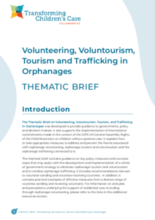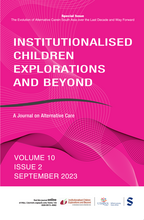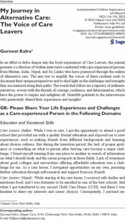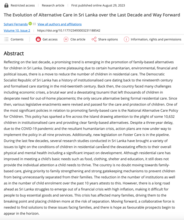Displaying 791 - 800 of 14518
This thematic brief contains guidance on key policy measures and concrete steps that may assist with the development and implementation of a whole-of-government strategy to eliminate orphanage tourism and voluntourism and to combat orphanage trafficking. It includes recommendations relevant to volunteer-sending and volunteer-receiving countries. In addition, it contains practical examples of effective measures from a diverse range of countries sending and receiving volunteers.
Researchers, members of faith communities, and other stakeholders are invited to contribute new written, audio, or video content through an online platform for public scholarship and informed commentary.
This case study explores the systems strengthening approach to implementing care reform in Kisumu County, Kenya.
For more than 150 years, spurred by federal assimilation policies beginning in the early 19th century, hundreds of thousands of Native American children were sent to boarding schools across the country. In many cases, they were forcibly removed from their homes.
This learning brief reports on the reflection and shares a collection of case studies collated by caseworkers in Kenya. Using Most Significant Change Storytelling, the caseworkers, supervisors and program managers selected and discussed stories from their work. They discussed what lessons these stories and the discussion drew out about the case management practice. The each of the stories illustrates one or more of the case management steps.
This article explores the existing policies and services that are prevalent in Bhutan that are enhancing childcare and protection. It also tries to bring forth the good practices that are currently in place and how it can be strengthened further by addressing challenges within the system. It also provides insight into history and evolution, and role of stakeholders involved in alternative care in the country.
This is a series of written interviews conducted with care-experienced persons from Bhutan, India, Nepal and Sri Lanka who have had experience with alternative care. These interviews were published in the September 2023 issue of the Institutionalised Children Explorations and Beyond journal.
This article explores the steady move towards family-based care in Sri Lanka over the last decade. The country has given priority to family strengthening and strong gatekeeping mechanisms to prevent children from being unnecessarily separated from their families.
Based on the literature and observation, this article explores ideas on the alternative care of children, particularly relating to its modalities and challenges in the context of Bangladesh. The authors opine that the children’s best interest cannot be achieved when a group grows without quality care.






